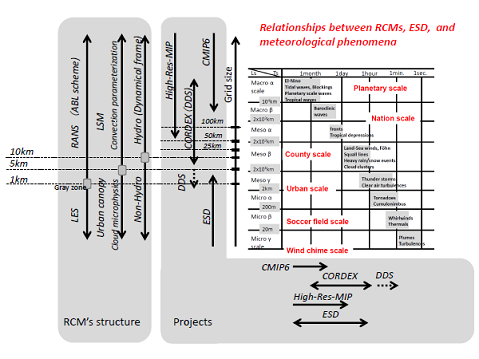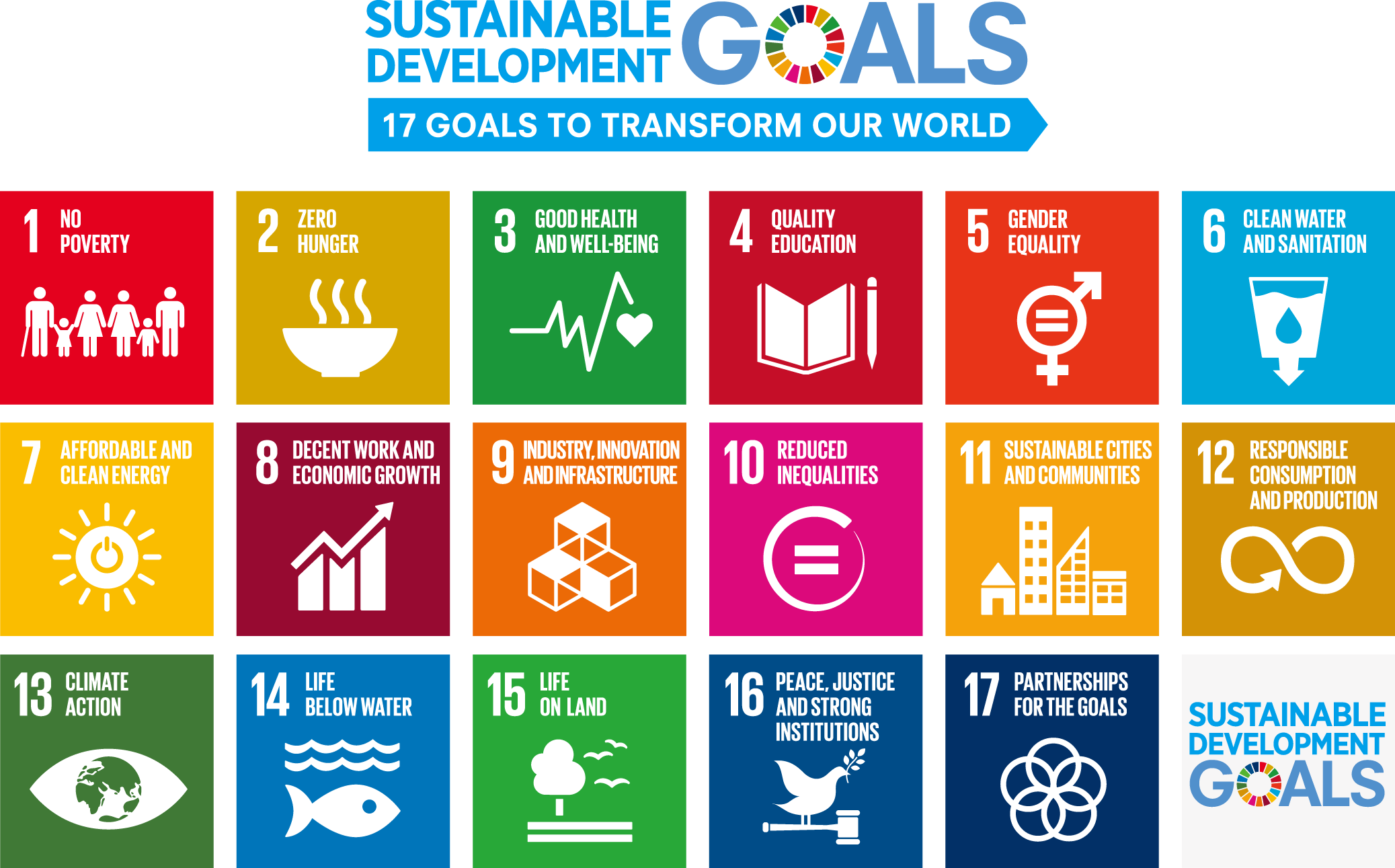
Sustainable Development Goals (SDGs) are common goals for the global community to achieve. Seventeen SDGs have been determined in General Assembly of the United Nations in 2015. These goals are composed of three main topics: social issues, economic issues, and environmental issues. Climate is one of the most important factors that affect many issues across the main topics of the SDGs.
As local climate information are indispensable for the assessment of local climate or environment, downscaling has been, for more than 25 years, believed to be a good technique to produce such local climate data. On the other hand, some researchers still suggest that downscaling is only a transient research field, which would disappear if the resolution of global models (GCM) becomes high enough. There are also more optimistic suggestions that downscaling research field continues as it responds to the diverse and specific demands of impact study researchers and end-users.
In this workshop, we would like to discuss two main issues.
In the workshop, we expect to have a free discussion on the potential of downscaling research.

*17 goals to transform our world, from SDGs
Registration
Opening Speech
Opening Speech
Opening Speech
Chair: Izuru Takayabu, Rapporteur: Hideki Kanamaru
Addressing Information Gaps and Data Needs for Adapting to Climate Change Impacts in the Southeast Asia Region Through the Southeast Asia Regional Climate Downscaling (SEACLID)/CORDEX Southeast Asia Project
Photo Session and Break
A Brief Review of Asian Climate Variability
Climate Downscaling for the National Climate Assessment: Practices and Challenges
Lunch Break
Chair: Hideo Shiogama, Rapporteur: Hiroaki Kawase
Future Climate, the Paris Agreement and Impacts on Society
Event Attribution with Large-Ensemble Simulations Generated by MRI-AGCM
Changes in Frequencies of Extreme Events Due to the Past,1.5˚C and 2.0˚C Warming
Chair: Shiori Sugimoto, Rapporteur: Rui Ito
Dynamical Downscaling: Is it Worth it?
Downscaling Procedure for Evaluating Future Regional Climate Change
Past Simulation and Future Projection of Snowfall over Mountainous Areas in Central Japan
Observing Mountain Weather Variability in Japan
Impact Assessment of Climate Change on Snow Water Resources with Combined Use of 5kmRCM and Multi-Ensemble 60GCM
Reception at Kisoji
Chair: Izuru Takayabu, Rapporteur: Yukari Osakada
Introduction of TOUGOU theme C -Integrated Climate Projection-
Regional Statistical Downscaling of Extreme Weather and Climate Indices: From Daily Data to Extreme Events
Impacts of SST Patterns on Rapid Intensification of Typhoon Megi (2010)
Initial Bubble for Idealized Simulations of Cumulus Convections
Break
Chair: Hidetaka Sasaki, Rapporteur: TBA
A Project on Regional Climate Change for East Asia and Korean Peninsula
Downscaling of CMIP-5 GCMs for Future Climate Projection over the Area of Southeast Asia and Thailand
Evaluation of NHRCM High-Resolution Climate Simulations over the Philippines
Lunch Break
Chair: Toshiyuki Nakaegawa, Rapporteur: Gomez Garcia Martin
Localized Climate Data and Risk Information in Support of Transformational Climate Change Adaptation in the Agriculture Sector
Challenges in Downscaling Research
Estimating Design Rainfalls Using Dynamical Downscaling Data
Toward Substantial Social Implementation of Climate Change Adaptation Technology. An Advanced Attempt in Hokkaido
Chair: Koji Dairaku, Rapporteur: Shaukat Ali
Summary of CORDEX Asia Project and Some Thinking of Future Collaboration
Hi-Resolution Multi-Ensemble Statistical Downscaling Regional Climate Scenarios
Performance Evaluation and Statistical Downscaling of CORDEX RCMs for Impact Assessment Studies in South Asia and South East Asia
Statistical Downscaling for South Asian Region
Statistical Downscaling for Daily Precipitation in Korea Using Combined PRISM, RCM, and Quantile Mapping: Part 1. Methodology and Evaluation in Historical Simulation
CORDEX Asia ESD Business Meeting (Invitation only)
Future Projections of Climate Extremes over Pakistan Using QM, DQM and QDM Statistical Downscaling/Bias-Correction
Dynamical Downscaling of Typhoon Events in Climate Projection of GFDL High-Resolution AGCM, HiRAM
Characteristics of Surface Incoming Solar Radiation in Japan: Comparison between In-situ Observations and a Large Ensemble of Regional Climate Simulations by NHRCM
Stochastic Downscaling of Rainfall Fields Using a Multi-Scale Analysis of Local Fluctuations
Predictability of the Rainy Season Onset in Central Highlands
Probabilistic Climate Projection for Japan with a Statistical Method Using CMIP5 Multi-Model Ensemble Experiments
Improved Representation of Urban Snow in NHRCM with a New Snowpack Scheme on SPUC
Analysis of Future Changes of Small-scale Torrential Rainfall under Global Warming Using MRI-NHRCM Output
The Interconnection Between Extreme Precipitation Events and Atmospheric Rivers over Japan
Regression-Based Statistical Downscaling for Multi Agro-Meteorological Elements over Japan and Their Comparison with Dynamical Downscaling Results
Multiscale Analysis on the Future Change of Heavy Rainfall in Baiu Season
Dynamical Downscaling for Precipitation Simulation over Thailand Using NHRCM
User Oriented Applications of Climate data: Performance Evaluation and Statistical Downscaling of CORDEX-RCMs for Impacts Studies in South Asia
Importance of Dynamical Downscaling with High-Resolution for Evaluating Simulated near Surface Temperature over the Mountainous Regions
Extreme Temperature Change in Taiwan
Chair: Faye Cruz, Rapporteur: Thanh Ngo-Duc
Climate of the Philippines and the Sea Surface Temperature Effect on Summer Monsoon Rainfall
Factors Behind the Inability of Regional Climate Modeling to Capture Monsoon Rainfall over the Philippines
Future Changes in Land-Atmosphere Feedback over India
Regional Climate Downscaling over Vietnam: Time of Emergence in Temperature and Precipitation Changes
Break
Chair: Izuru Takayabu
Wrap-up Discussion
Please apply by clicking the button below. When we receive your entry, we will confirm it by E-mailing you. Fields indicated with an asterisk(*) are required.
Your personal information provided here will be managed by the Secretariat of the Symposium, Prime International Co., Ltd., and your data will be used only for the purpose of this Symposium. Your personal information will be disclosed to other agencies who are involved in organizing this Symposium. Unless otherwise agreed by you or requested by law, your personal information will not be disclosed to the third parties except to those who are engaged in this Symposium. If you have any questions or comments on personal information, please contact the Symposium Secretariat.
Prime International Co., Ltd.
TEL: 03-6277-0117, FAX: 03-6277-0118
E-MAIL: dsws2017@pco-prime.com
The deadline of abstract submission for oral presentation has been postponed, 4 September 2017.
A one page abstract (A4 size, 210 x 297 mm) is required for each presentation. It should contain the title of paper, author(s), affiliation(s), postal address, main text (including all figures, tables and references) and e-mail address of the main author.
Detailed instructions are available in sample_abstract. The abstract should be in pdf format or word file. You can submit your abstract through abstract submission on the website of "International WS on DS 2017 at Tsukuba."
Your registration number will be required for your on-line abstract submission.
Please complete your on-line registration before abstract submission.
If you are unable to upload your abstract using this form, please send your abstract (in a PDF file) as an e-mail attachment to dsws2017@pco-prime.com.
Prime International Co., Ltd.
TEL: 03-6277-0117, FAX: 03-6277-0118
E-MAIL: dsws2017@pco-prime.com
Address: 2-20-3, Takezono, Tsukuba, Ibaraki, 305-0032, Japan
10 min. walk from bus station.
Phone: +81-(0)29(861)0001
Fax: +81-(0)29(861)1209
2-20-3, Takezono, Tsukuba, Ibaraki
Phone: +81-29(860)7700
Fax: +81-29(860)7701
2-20-1, Takezono, Tsukuba, Ibaraki

Tsukuba station is a train station of Tsukuba Express line (TX) located in the basement. Go up the escalator at Exit A3, and you will come to Tsukuba Center bus terminal, where major airport and local buses depart/arrive.
At the Tsukuba center, turn around southeast to find out the wide steps which may be decorated with a few seasonal flowers. Go up the steps and you will be on the pedestrian and bicycle path, a green-marked line on the map. Walk straight down the path approximately for 800 m. Then, you will find the light-brown, four-floor EPOCHAL Tsukuba on your right. (approx. 10min walk)
Travel arrangement should be made individually.
Using a bus is the easiest way to get to Tsukuba from Narita Airport.
Time table for Aiport Liner NATT’S
Take the bus bound for Tsukuba Center from Terminal 1 Bus stop No.8 or Terminal 2 Bus stop No.10 (approx. 100 min.)
Fares: 2,200 yen
*Bus ticket cannot be reserved from Narita / Haneda airport to Tsukuba center .
*From Tsukuba center to the airport, bus ticket should be reserved in advance.
Take the bus bound for Tsukuba Center from International Terminal Bus stop No.6 (approx. 120min.)
Fares: 1,850 yen
Time table (Keihin Kyuko Bus)
*Bus ticket cannot be reserved from Narita / Haneda airport to Tsukuba center .
*From Tsukuba center to the airport, bus ticket should be reserved in advance.
Major routes from Haneda Airport International Terminal station to Tsukuba station are:
For details, please see Haneda airport’s access infomation by rails and monorails and TX info. below.
Approx.45-52min., 1,190 yen. About 4 services every hour.
Timetable (TX) from Akihabara.
The closest and most convenient hotel is Okura Frontier Hotel Tsukuba – Epochal.
(8 min. from Tsukuba Station on foot, located next to the venue)
Okura Frontier Hotel Tsukuba (Main Building)
2 min. from Tsukuba Station on foot, 8-10 min. walk to the venue
The organizer blocked some rooms at Okura Frontier Hotel Tsukuba EPOCHAL and also at the main building from October 1st for 4 nights for special conference rate. More details will be announced in the registration confirmation e-mail.
* Please be noted that the first come, first served. Reservation will be closed on September 18th.
Participants are recommended to purchase appropriate travel insurance before coming to Tsukuba, Japan. Secretariat is not responsible for any kind of personal acccidents, sickness, theft, or property damage encountered by conferees during theirstay in Tsukuba.